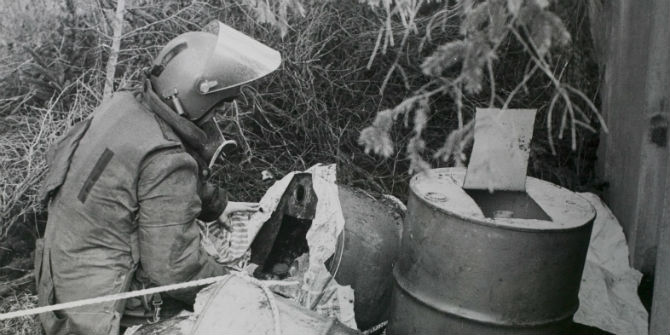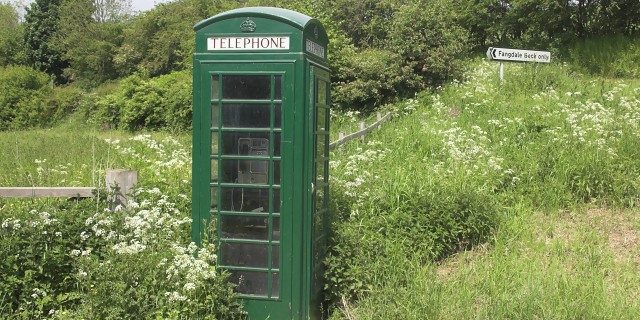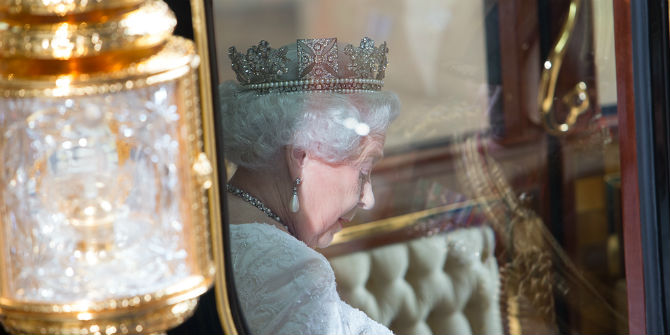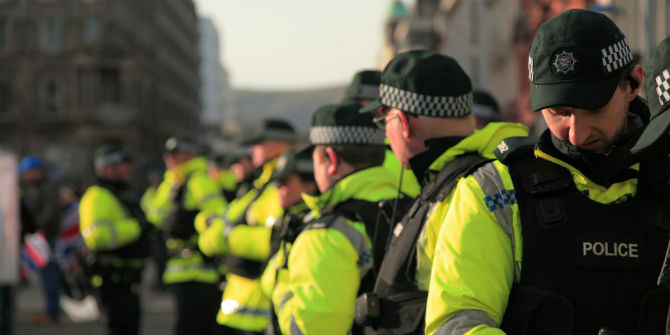 The prospect of a Brexit deal has foundered on the issue of the Northern Ireland border. Duncan Morrow (Ulster University) explains why the delicate relationship between Ireland and its dysfunctional neighbour depended on the EU’s fluid borders to survive. Any effort to ‘do’ Brexit on Johnson-DUP terms means that devolution in Northern Ireland will ‘die’, forcing an unpopular Westminster government to take direct control amid huge social, political and economic turmoil.
The prospect of a Brexit deal has foundered on the issue of the Northern Ireland border. Duncan Morrow (Ulster University) explains why the delicate relationship between Ireland and its dysfunctional neighbour depended on the EU’s fluid borders to survive. Any effort to ‘do’ Brexit on Johnson-DUP terms means that devolution in Northern Ireland will ‘die’, forcing an unpopular Westminster government to take direct control amid huge social, political and economic turmoil.
The crisis of legitimacy over the right of the British state and its supporters to exercise authority anywhere on the island of Ireland has always afflicted any efforts to govern Northern Ireland. In the democratic era, Irish anti-imperialism crystallised into an unquenchable demand for independent Irish statehood as a ‘nation once again’. But democracy also mobilised the masses in the north-east, where Ulster Unionists successfully organised a popular ‘counter-militia’ threatening violent resistance to any move to devolve power to Dublin, let alone independence, and proclaimed undying loyalty to the Empire and their birthright within it.

From the perspective of Westminster in 1920, Northern Ireland was the pragmatic answer to the conundrum. But it was always more expediency than principle. When Northern Ireland finally settled into its six county boundary, the border did not so much divide Unionist from Nationalist Ireland as separate overwhelmingly nationalist Ireland from the British-Irish interface in the north. Simultaneously, and less obviously, a new devolved half-‘border in the Irish Sea’ stealthily contained Great Britain from Northern Ireland affairs. It created a United Kingdom where the vast majority were increasingly and blissfully ignorant of both the origins and consequences of British statecraft.
The ‘two borders’ combined to insulate this contentious remnant of British-Irish popular confrontation into its own ‘place apart’. Northern Ireland was left to itself, a quarantine for the historically disturbed, ostensibly fighting over the Empire while rerunning the Reformation. Unionists held power and demanded recognition of their legitimacy, while Nationalists, deeply alienated in their own home, refused to oblige.
When tensions escalated into violence in the late 1960s, the British and Irish governments were forced into massive efforts to prevent internal collapse and the wider spread of violence. By the 1980s both concluded that only a common front, eased and facilitated by deepening co-operation as equal members of the European Community, could bring significant change. Thirteen years of intense negotiations followed, during which both the United States and the European Union acted as critical ballast in a fragile experiment.
At the heart of the Good Friday Agreement in 1998 was a radical – but implicit – compact on sovereignty in Ireland. Its key achievement was to finally establish a basis for the legitimacy of government in Northern Ireland. This remarkable feat was achieved in part by the historic accident that radical experiments in theory – like changes in sovereignty, citizenship and rights – became invisible and painless in practice within the functional reality of the EU, where crossing borders was encouraged and other changes were already implied or in place. Mutual citizenship was extended in a wholly unique way, equality of treatment for citizens and non-citizens of the sovereign state was enshrined and internal bodies were interdependent with cross-border bodies, all without any significant disruption.
In this context, the lethal and deeply rooted concept of ‘legitimate targets’ was set aside in favour of ‘purely peaceful and democratic means’. The UK-Ireland border was transformed from a symbol of contention into a model of co-operative inter-nationalism. Army checkpoints disappeared and hundreds of border roads reopened. Armed groups melted into the background. The Irish President visited the North as if it was already a normal part of the jurisdiction. Meanwhile devolution in the UK went mainstream and Northern Ireland was no longer so distinctively ‘odd’, but plausibly part of a multi-dimensional reform of the whole state. Restrictions on movement to Britain were reduced with the softening of the Prevention of Terrorism Act. There were still two ‘borders’ of sorts, but now they were ‘boundaries’, not security fences. Royal and presidential visits sealed a remarkable reboot of British-Irish relations that few in the 1970s dared hope for. Set against the slaughter of the Troubles, it was immeasurably better than the past.
Perhaps complacency accounts for why so few took seriously the potential for polarisation for Northern Ireland that Brexit carried within it. Certainly few in any jurisdiction appear to have understood how critically the Agreement depended on fundamental British-Irish partnership. But the ‘ecosystem’ logic (‘nothing is agreed until everything is agreed’) behind the Agreement is also its vulnerability. The Agreement becomes exposed to total collapse when core parts of the ecosystem fail.
In retrospect, the implications of the UK’s land border with ‘Ireland’ for ambitions for a clean break from ‘Europe’ were only superficially addressed in the referendum campaign. Neither campaigners nor voters dwelled on how Brexit’s implicit demand for hard borders contradicted the subtle status of Northern Ireland’s boundaries, and automatically reinvigorate the issue of identity. In turn, this would re-inflame the dormant question of the legitimacy and viability of Northern Ireland. Promoted as a way to ‘take back control’ from EU bureaucracy, few grasped that Brexit potentially also disabled the baseline partnership of the UK and Ireland, and with it the fundamental basis on which any semblance of control had been possible in Northern Ireland.
But now the implications of this contradiction have escalated to become the defining crisis of the Brexit psychodrama. Hard borders to ‘Europe’ mean hard borders to Ireland. But hard borders in Ireland will mean the collapse of Britain’s arguably most significant post-colonial achievement.
By now almost every way to resolve the contradiction has been offered and rejected. The logic of a ‘customs border in the Irish Sea’ was interrupted on numerous occasions by the DUP after they captured the balance of power in Westminster in 2017. Theresa May’s ‘solution’ was to save the Union by delaying Brexit for everyone, but only at the cost of revolt by the Brexiters in her own party. And still, without commitment to an open border in Ireland, the EU would not play.
Armed with a commitment to ‘do or die’ before Halloween, the Johnson government has proposed that Northern Ireland should stay within the Single Market in an all-island regulatory zone while leaving the Customs Union. This will require some checks on goods entering Northern Ireland from Great Britain and between both parts of Ireland. But the prospect of two borders replacing no borders, businesses apoplectic about the bureaucracy that will replace “frictionless trade”, the risk of a ‘smuggler’s paradise’ and the unilateral award of a one-party veto to Unionism dismayed almost everyone outside the DUP, including other Unionists.
In the absence of a workable solution, the threat, if there is one, comes not from security but from politics – or at least from the absence of a viable political process. The fear which haunts Northern Ireland is a legacy of the 1960s, when protest escalated to confrontation in the context of a crisis of legitimacy. Violence which nobody had even contemplated in 1967 suddenly outgrew its container and took on a tragic dynamic after 1969. No political party could either predict or control it.
There is widespread consensus that neither republican nor loyalist ultras have the capacity or any support at present for a return to mass killing. There is some cause for hope in the fact that Northern Irish voters approved the Agreement but rejected Brexit, suggesting the Agreement has greater legitimacy. But in practice, any effort to ‘do’ Brexit on Boris-DUP terms means that devolution in Northern Ireland will ‘die’, forcing an unpopular Westminster government believed by the majority to have destroyed Northern Ireland’s best chance for change, to take direct control amid huge social, political and economic turmoil. The decisions to extend abortion legislation and gay marriage to Northern Ireland can rely on popular support. But in a context where the Agreement has greater legitimacy than Brexit, every controversial decision, even on apparently unrelated issues, has at least the potential to become a constitutional crisis.
This is what happens when small border zones are treated as expendable collateral in the supposedly more important affairs of larger states. But it is a bleak prospectus for a place which has never shaken off historic hostilities and can only exist if the ecosystem around it enables it to do so.
This post represents the views of the author and not those of the Brexit blog, nor LSE.







I may well be shot down in flames here, because I am about to be heretical. I appreciate that as someone who is not an expert and has never lived in Northern Ireland I may be missing some important point.
1. Surely the binary division “hard border” and “soft border” is misleading? There is a spectrum. At one end you have something like the old Berlin Wall, at the other end no division at all.
2. The spectrum is roughly defined by the amount of time and other resources required to get people or things from one side of the border to the other.
3. It seems to me asking too much to say that any additional time or any additional resources required to cross the Irish border should be completely ruled out. If for example the additional time is less on average than it takes to get through a traffic light, then of course this will be annoying for people who have to cross the border regularly, but it is not a major annoyance.
4. Surely it is possible to devise in these circumstances some kind of customs checks that do not take that much time? You could imagine, for example, that somebody who drives across the border regularly who has preregistered the car numberplate must pull over one time in 20 for three minutes to have someone look in the boot, check the back seat and inside any suitcases for signs of obvious contraband. Maybe one time in 100 there could be a more thorough ten minute check. That makes a total average delay of 15 seconds, which is rather less than a typical traffic light. If you want to drive over the border with a truck full of potatoes, someone might have to poke in the middle of the potatoes to check you are not hiding smuggled goods, but that would also not take so long, surely. Wouldn’t such checks be enough to deter most smuggling?
5. That means physical checkpoints somewhere. Where the border is excessively wriggly, it would make sense to put them some way back from the border. That would create areas where customs are not strongly enforced (though smuggling might be caught in other ways, for example smugglers would still have a money laundering problem), but would such a pragmatic approach breach WTO rules or violate the integrity of the Single Market?
6. Some have argued that any kind of customs posts would provide a target for terrorists. Perhaps. But if for example I were a terrorist wanting to shoot a few police officers, wouldn’t it be easier to fake some kind of incident (like a burglary) and shoot them when they turn up? The police can hardly help being visible, whether manning customs posts or not.
Maybe I am just ignorant with no idea of Northern Ireland affairs. But could someone better informed explain to me in words of one syllable what I am not understanding?
It would take a very long post to explain about this border across the island of Ireland.
Pretty much everything you say can be countered. The border is ‘wriggly’ everywhere; it can be in the middle of the road, it can divide a house into two, and yet it is at present almost invisible. There are some differences north and south around currency and VAT, for example, but these are factored in. Anything more than this is ‘friction’.
One-third of milk produced in the north goes to the south to be processed; and it might return afterwards. If there is a customs border, the tariffs will make production unprofitable; if there is a regulatory border, such cross border activity will simply be impossible.
In the past, the border was a customs one; there was free movement across it for Irish and British citizens, but not for others. On a 10 mile journey from Clones in the south towards Cavan, also in the south, the train crossed the border 6 times; and stopped every time it crossed. There are only four crossings if you go by road. The effect of the border was the destruction of markets in local towns, such as Clones and Derry where the hinterland was largely in Donegal in the south. It’s only from the 1980s that this has improved.
And don’t think that infrastructure would be safe; it doesn’t take many disaffected people to blow things up; Semtex may not be so available, but there is always ‘Coop mixture’.
And so on…
@Korhomme: Thank you. You obviously know much more about this than I do, so I think I shall retreat, cowardly, from the fight. However please permit me to preserve some dignity by waffling a bit. If I say anything stupid please correct me.
I can see that, where milk products cross the border several times, a no-deal Brexit is going to be a big problem, not so much because of tariffs, but because if someone sells butter (for example) in the Republic, it would be necessary to ensure it has been produced according to EU standards starting from the cow, which means you can’t avoid EU regulations being applied and enforced north of the border if this is to work. I suppose you could in theory envisage something like the EU organic certification standards, which allow food to be sold as organic inside the EU even if produced outside, but this would probably require a complete reconfiguration of EU agricultural policy, whch isn’t going to happen.
I think controlling tariffs could be made easier if you are allowed to do the controls back from the border, leaving an area between the UK control line (for goods entering the UK) and the Irish control line (goods entering Ireland) where there are no direct controls. (So the houses or villages on the border would be inside this area.) The bigger this area is allowed to be, the more flexibility you have to reduce the number of control posts and the number of people living close to the control line. But of course you cannot avoid some farmers who farm on both sides of the control line, or other people who have to cross it frequently, who would have a problem.
No doubt they have their reasons. But I cannot understand how the DUP keep on supporting various forms of hard Brexit, and are so resolutely opposed to various forms of “backstop”.
Senior DUP politicians lived through the horrors of the Troubles just the same as everyone else. Surely even they must see that the Good Friday and St Andrews Agreements, even with all their imperfections, are miles better than any return to the sectarian confrontation of the past.
Freiedrich, the DUP’s only motivation is to propogate the survival of their medieval views, and supremacy over the Irish Republican / Catholic segment of their “Wee State”. But they are a receding minority, and eventually NI will succumb to logic and become part of a united Ireland. NI is just one of the last gasps of the old British Empire, and is doomed to follow India, Australia, Canada and etc. to freedom from Westminster control – as is Scotland in the very near future.
@Jams: I think the Unionists in the Wee State of Northern Ireland, not to mention the inhabitants of the Wee States of Scotland and England and communities in Wee and Muckle (is that the right word?) states all around the world, would all get along much better if they could recognise the legitimacy of each others’ cultures, traditions and loyalties. You may not feel British but the Ulster Unionists do. Insulting them as mediaevalists doesn’t help anyone. The NI peace process succeeded because both sides were willing to compromise and not seek a winner-takes-all solution. If the people of NI should sometime decide to join the Republic, I hope there would still be room in Ulster for the Ulster Unionists and their proud traditions.
“dysfunctional neighbour”
The Republic defaulted 10 years ago. The UK bailed it out.
Which is the “dysfunctional neighbour”?